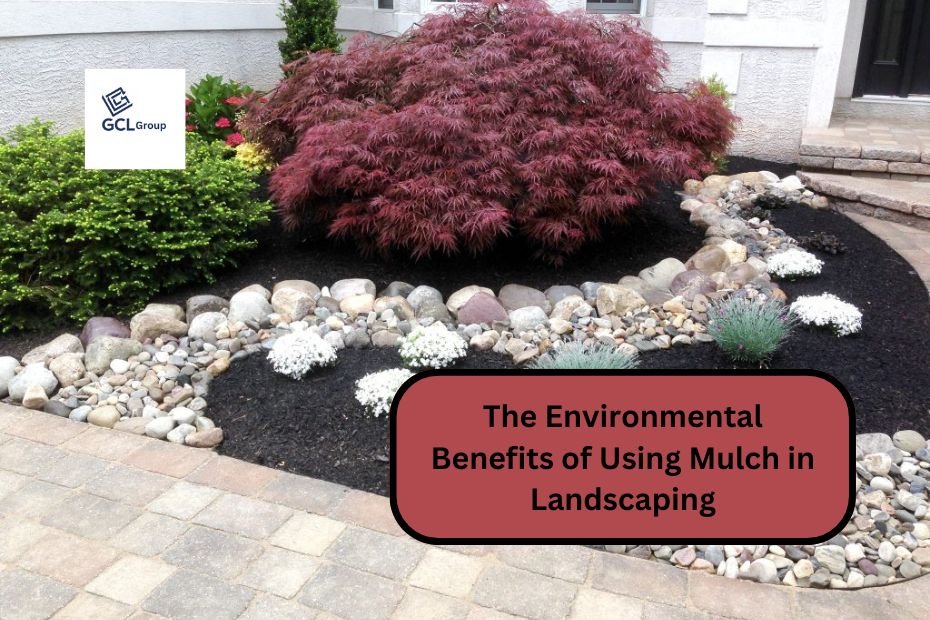Mulching has long been a cornerstone of effective landscaping practices, but its benefits extend far beyond aesthetics or weed suppression. The environmental advantages of using mulch make it an essential tool for creating sustainable, eco-friendly gardens and landscapes. From conserving water to improving soil health, mulch offers a variety of benefits that contribute to a healthier environment.
What is Mulch?
Before diving into the environmental benefits, let’s define what mulch is. Mulch refers to any material placed over soil to cover it. It can be organic, like wood chips, straw, or compost, or inorganic, like stones or plastic sheeting. Organic mulches break down over time and enrich the soil, while inorganic mulches tend to last longer but don’t provide as many soil health benefits.
Types of Mulch
There are several types of mulch, each with its unique advantages:
- Organic Mulch
- Wood Chips and Bark: These are popular for garden beds, trees, and shrubs. As they decompose, they enrich the soil.
- Compost: Acts as a nutrient-rich mulch, providing both a protective covering and a natural fertilizer.
- Grass Clippings: A great way to recycle lawn waste, grass clippings can be spread thinly to provide a nutrient boost.
- Leaves: Collected from autumn leaf fall, leaves decompose quickly and add organic matter to the soil.
- Straw and Hay: Useful for vegetable gardens, these mulches decompose slowly and help with moisture retention.
- Inorganic Mulch
- Gravel and Stone: Long-lasting and decorative, but they do not break down or contribute nutrients to the soil.
- Plastic Sheeting: Effective in preventing weed growth, but not environmentally friendly due to its synthetic nature.
- Rubber Mulch: Made from recycled tires, this mulch is durable and great for playgrounds but can release toxins as it breaks down.
Environmental Benefits of Using Mulch
1. Water Conservation
One of the most significant environmental benefits of mulch is its ability to conserve water. Mulch helps to reduce evaporation by creating a barrier between the soil and the air. This means that less water is lost from the soil, which is especially important in arid regions or during periods of drought.
By keeping the soil moist, mulch reduces the need for frequent watering. This is a crucial benefit in times of increasing water scarcity and can help reduce water consumption in both home gardens and large landscaping projects.
2. Soil Health Improvement
Organic mulch improves the quality of the soil as it decomposes. The breakdown of materials like wood chips, leaves, and straw adds essential nutrients to the soil, creating a richer environment for plant growth. This natural fertilization process reduces the need for chemical fertilizers, which can have harmful effects on the environment.
Furthermore, mulch helps to enhance the structure of the soil. It prevents compaction by protecting the soil from heavy rainfall, which can cause erosion and nutrient runoff. Loose, well-structured soil allows for better air and water circulation, which is essential for healthy plant roots.
3. Erosion Control
Mulch plays a significant role in controlling soil erosion. By covering the soil, mulch reduces the impact of raindrops, which can dislodge soil particles and lead to erosion. This is particularly beneficial on sloped landscapes where erosion can be a major problem.
Mulch also helps to hold the soil in place by providing a protective layer that prevents wind from carrying it away. This not only protects the landscape but also prevents sediment from washing into nearby water bodies, where it can cause pollution.
4. Weed Suppression
Weeds can be a significant problem in gardens and landscapes, but mulch provides an effective natural solution. By blocking sunlight, mulch inhibits the growth of weeds, reducing the need for chemical herbicides. This not only keeps the garden looking tidy but also reduces the environmental impact associated with using harmful chemicals.
Less weed growth also means that garden plants have less competition for water, nutrients, and sunlight, allowing them to thrive.
5. Temperature Regulation
Mulch acts as an insulating layer that helps to regulate soil temperature. In the summer, mulch keeps the soil cooler by shielding it from the sun’s heat, and in the winter, it helps retain warmth in the soil. This temperature regulation is beneficial for plant health, as extreme fluctuations in soil temperature can stress plants and slow their growth.
By moderating soil temperature, mulch creates a more stable environment for plants, improving their resilience to extreme weather conditions.
6. Reduction in Pesticide Use
Many gardeners find that using mulch reduces the need for pesticides. Organic mulches, in particular, promote the growth of beneficial organisms, such as earthworms and soil microbes, which help to control pest populations naturally. These organisms contribute to a healthier ecosystem, reducing the need for harmful chemical interventions.
7. Carbon Sequestration
Organic mulch, when it decomposes, helps sequester carbon in the soil. This process captures carbon dioxide from the atmosphere and stores it in the soil, which helps mitigate the effects of climate change. While mulch itself doesn’t absorb large amounts of carbon, its ability to improve soil health can lead to increased carbon sequestration over time.
8. Habitat Creation for Beneficial Organisms
A layer of mulch provides a habitat for beneficial organisms such as earthworms, beetles, and various microorganisms. These creatures are essential for healthy soil, as they help decompose organic matter, aerate the soil, and promote nutrient cycling.
By creating a supportive environment for these organisms, mulch contributes to a more biodiverse and resilient landscape.
9. Reduction of Waste in Landfills
Using organic materials like leaves, grass clippings, and wood chips as mulch helps divert yard waste from landfills. Instead of sending these materials to a landfill, where they would contribute to methane emissions, they can be repurposed to improve soil health. This reduces the amount of waste produced and contributes to a more sustainable landscaping practice.
How to Effectively Use Mulch for Environmental Benefits
1. Choose the Right Type of Mulch
To maximize environmental benefits, choose organic mulches that decompose naturally and improve soil health. Wood chips, bark, straw, and leaves are all excellent options.
2. Proper Application
Apply mulch to a depth of 2 to 4 inches to effectively suppress weeds, conserve moisture, and regulate soil temperature. Be careful not to pile mulch directly against the trunks of trees or stems of plants, as this can lead to rot.
3. Regular Maintenance
Replenish organic mulch as it breaks down over time to ensure continuous benefits. Inorganic mulches, such as gravel or stone, may need less frequent maintenance, but they should still be checked periodically to remove debris or accumulated organic matter.
4. Consider Mulching Leaves in Place
Instead of bagging and disposing of leaves in the fall, consider mulching them into your lawn or garden beds. This adds organic matter to the soil and reduces the need for store-bought mulch.
Conclusion
Mulching is more than just a landscaping technique; it is an environmentally friendly practice that offers numerous benefits to both your garden and the planet. From water conservation and soil health improvement to reducing the need for chemical inputs, mulch contributes to creating more sustainable landscapes. Organic mulches, in particular, are excellent choices for reducing environmental impact, promoting biodiversity, and sequestering carbon in the soil. By incorporating mulch into your landscaping practices, you not only enhance the beauty and functionality of your garden but also contribute to a healthier environment for future generations.
| Home | Click Here |
| Category | Click Here |

